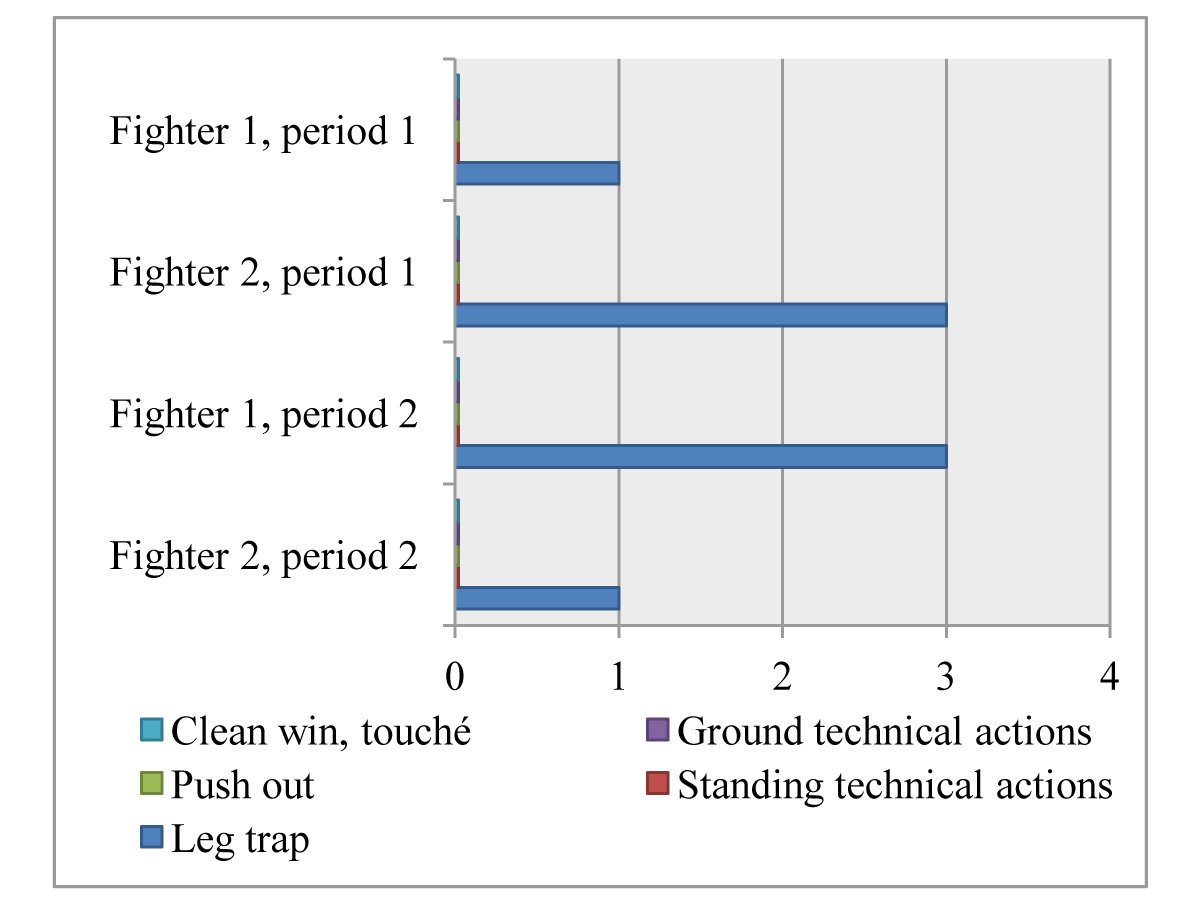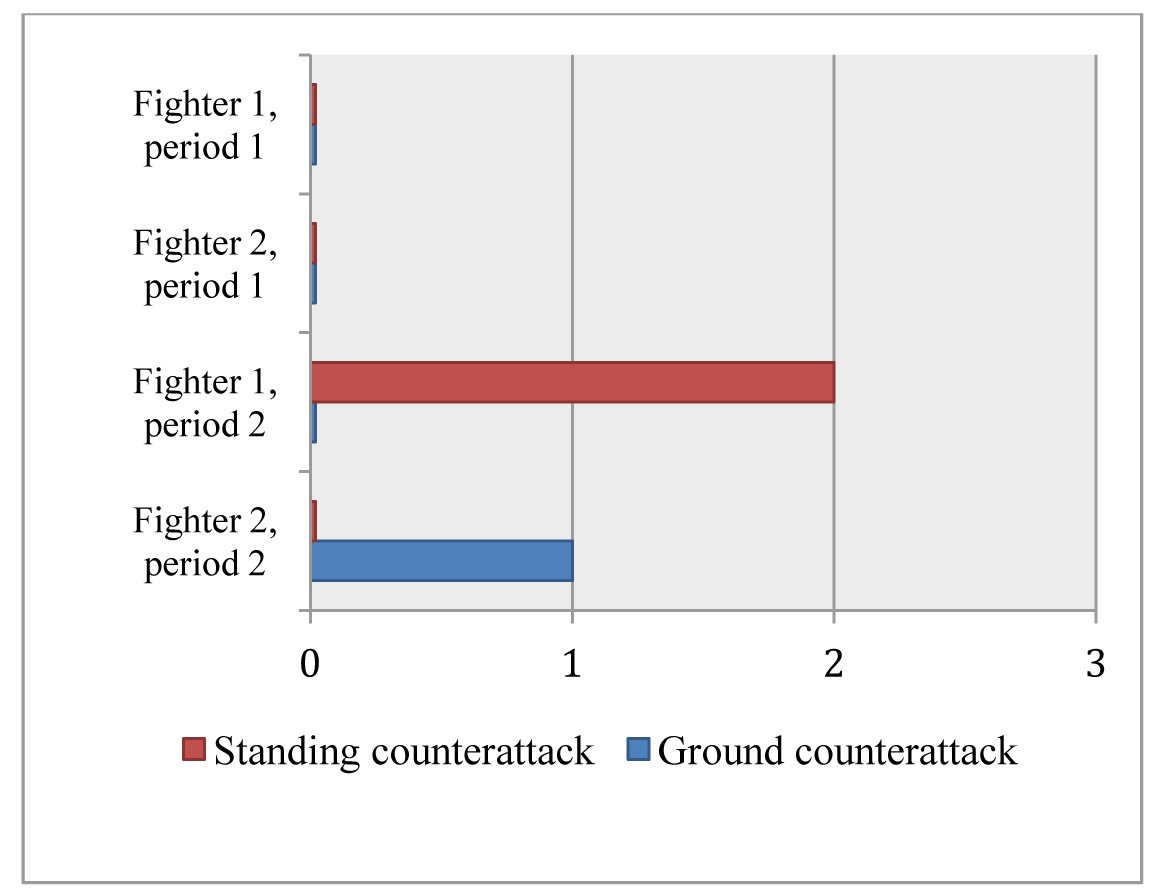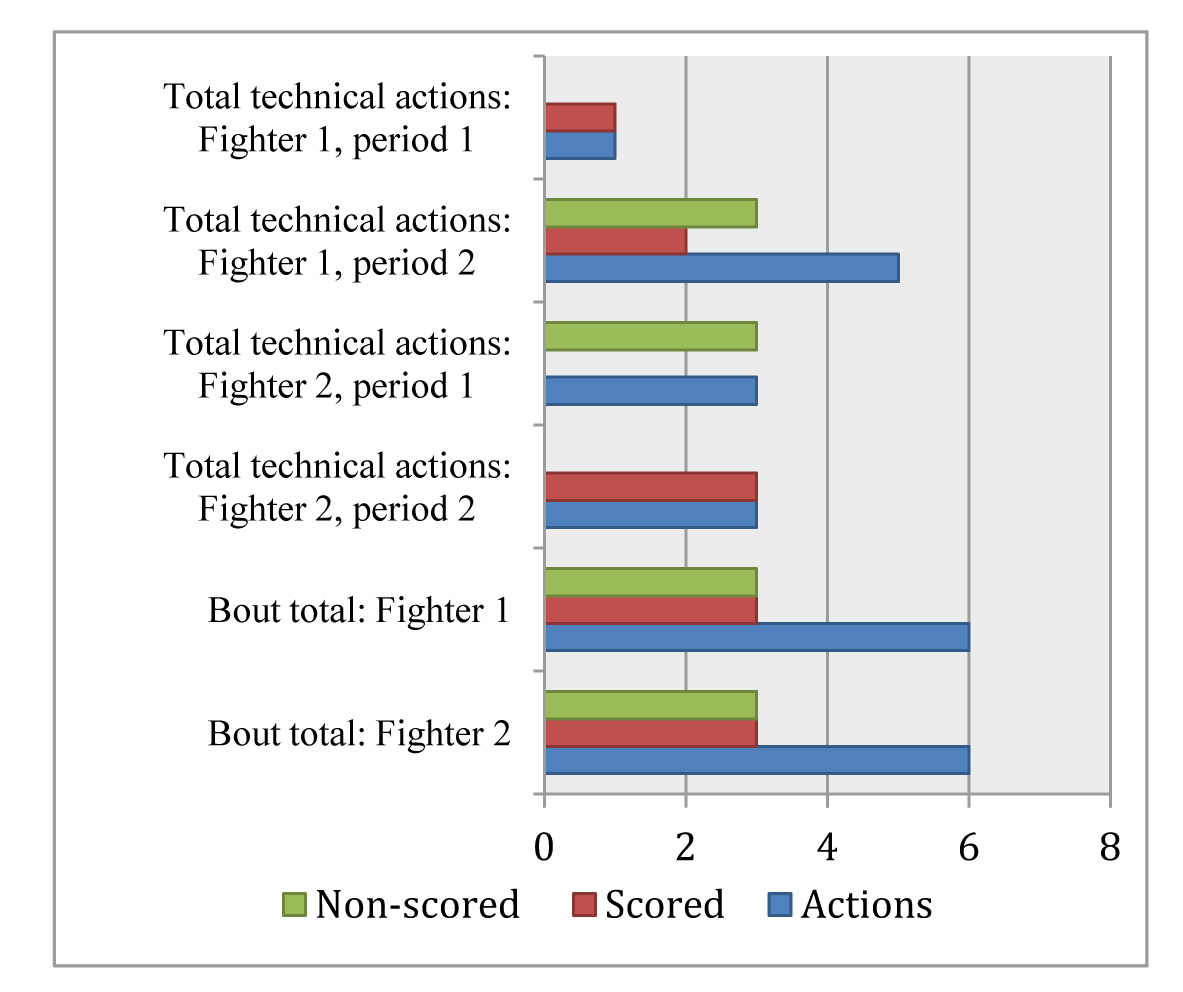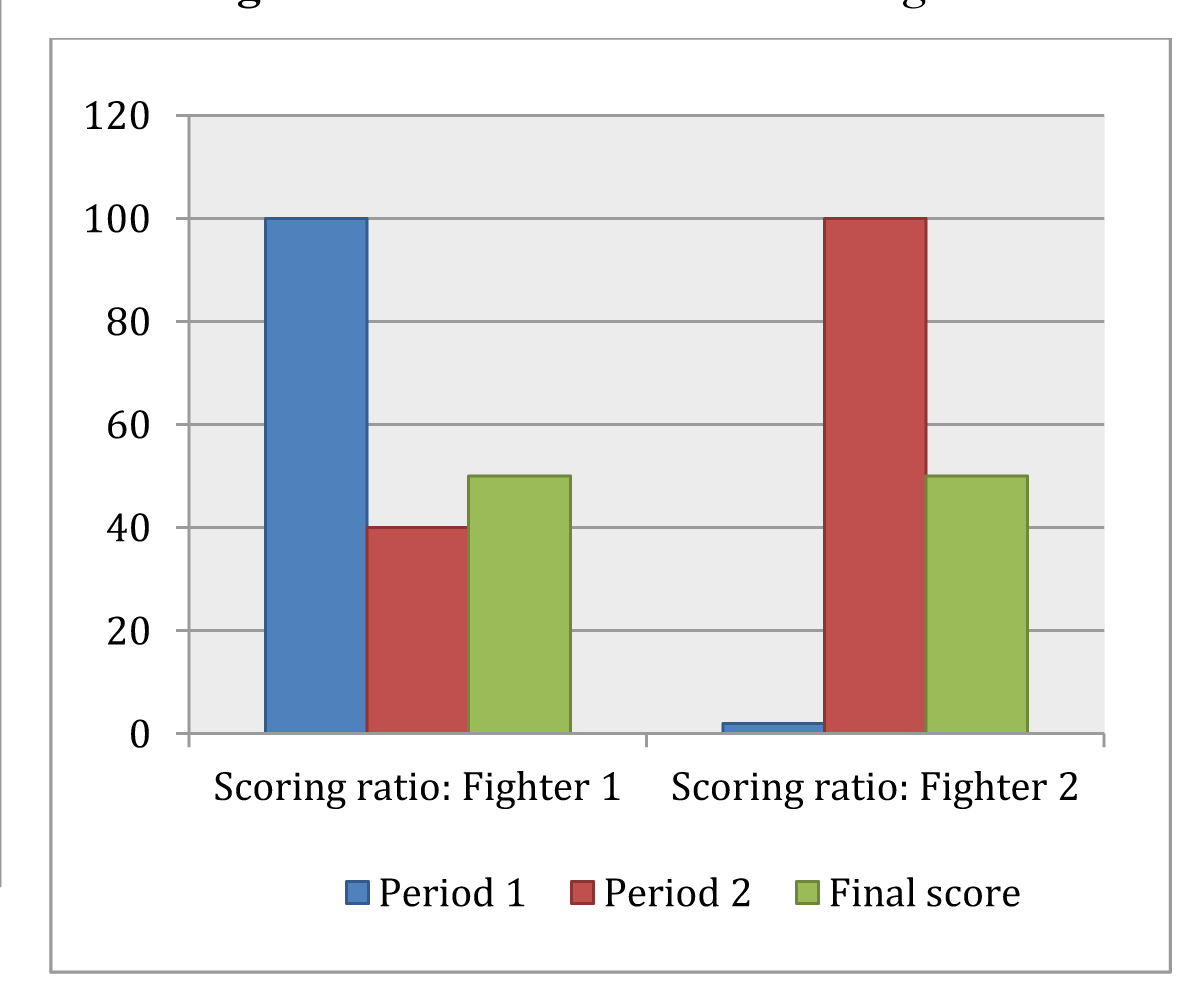Integrated theoretical and practical provisions for elite martial artists in Far North
ˑ:
PhD, Professor M.G. Kolodeznikova
Institute of Physical Culture and Sport of North-Eastern Federal University named after M.K. Ammosov, Yakutsk
Keywords: theoretical and practical provisions, martial artists, competitive performance analysis, athletic technique biomechanics, physical fitness, mental fitness.
Background. The latest development trends in the Russian and international elite sports urge the national sport research, management and expert communities to look for new effective training systems and their advancement solutions and put the sport elite trainings on an integrated modern theoretical basis. As things now stand, the sport elite training systems in martial arts include multiple interrelated components including the relevant theoretical and practical provisions and modern technologies advanced by the sports science.
Objective of the study was to offer a set of new theoretical and practical provisions to improve the training systems and competitive performance of the Sakha Republican (Yakutia) elite martial artists in the national and international events.
Methods and structure of the study. To develop a comprehensive theoretical basis for the martial arts elite trainings at the Republican Sport Teams Training Center (RSTTC) in Yakutia, the Ammosov Institute of Physical Culture and Sport (IPCS) of North-Eastern Federal University formed a task team of the IPCS researchers, psychologists and Republican Sport Teams Training Center sport physicians.
The task team sampled elite indigenous freestyle wrestlers, deaf wrestlers and boxers for the purposes of the study. As demonstrated by a few study reports on the Northern indigenous people’s adaptability, the centuries-old evolution has formed a special adaptability in many aspects that makes it possible to survive and stay healthy in the harsh climatic conditions [4-6].
Due to the relevance of the problem, the Government of the Republic of Sakha (Yakutia) provided a grant support for our study of 20 gene polymorphs associated with the physical qualities and pathological conditions of the cardiovascular system, and we used the relevant clinical and instrumental test methods to rate the sample physicality. We also run molecular genetic studies to rate a few key physical qualities (speed, strength, endurance) and exposure of the sample to the cardiovascular system pathologies; and to find markers of a predisposition to martial arts and other endurance-, speed-strength- and strength-intensive sport disciplines of a special promise for the indigenous Yakut athletes with the studied 20 gene polymorphs. We also run a prior questioning survey of the national team coaches in the sampled sports to identify the key problems and potential solutions and to develop a work plan for the task team based on their comments and recommendations. The task team work plan set clear goals in agreement with the senior coaches. To create a database and discuss theoretical and practical provisioning issues, staged tests were run to profile the athletes’ physical progress and performance, with the comprehensive analyses of the test data in every training stage.
Results and discussion. The staged tests were run to individualize the theoretical and practical provisions for every elite subject based on analyzes of the competitive performance, technical and tactical performance biomechanics and the physical and mental fitness profiles. The competitive performance analyses were made using the K.S. Kolodeznikov [1] and V.V. Efremov [2] analytical method and matrix with indication of the place and date of the competitive event, weight class, periods, attacks, counterattacks and defenses – to produce competitive performance diagrams (Figures 1-4) with ratings of the refereeing and corner actions: see the Table hereunder.

Figure 1. Technical actions: attack

Figure 2. Technical actions: counterattack

Figure 3. Technical actions: total

Figure 4. Technical actions: scoring ratios
Total t
|
Referees’ and corners’ actions in bout
|
||||||||||||||||||||||||||||||||||||||||||||||||||||||||||||||||||||||||||||||||||||||||||||||||||||
|
|
||||||||||||||||||||||||||||||||||||||||||||||||||||||||||||||||||||||||||||||||||||||||||||||||||||
The technical and tactical action biomechanics were analyzed and scored by experts with analyses of the bout replays to make the following recommendations: Fighter 2 was effective in the counterattacks, fast in the attacks and situation-specific responses and solutions; albeit limited in responses to the leg trap attempts by the simple back jumps. He needs to expand the defense and counterattack toolkits and make progress in the power struggle, otherwise he yields under pressure from the mature and experienced fighters. Fighter 2 needs to improve the defenses and counterattacks, particularly the counterattacks against the leg trap attempts, in the low defense stance with the hand rest when pulling down. The attack techniques must be improved to restrict mobility of the pelvis, improve the opponent’s hip joints locks and the fight control skills in the challenging counterattack situations. The tactical skills must be improved with a special priority to the footwork, activity and power struggle.
The mental fitness analysis found a high competitive motivation including the success and self-perfection components, favorable for the current situation and in the short run. Situational anxiety was found adequate; training motivations were rated optimal. The fighter was rated reasonably tolerant to the competitive stressors and distracters. The self-esteem is relatively high, with the fighter highly optimistic about his own fitness and skills. Based on the mental fitness analysis, we recommend the following: special attention should be paid to progress in a few special physical qualities to indirectly improve the mental fitness and mental-emotional background for the trainings and competitions. Mental control excellence and ideomotor trainings should be continued on schedule.
The above-described analytical pattern with the individual progress tests supported by the coaching team’s survey data was applied to rate the actual progresses and offer individual progress recommendations for every fighter under study [3].
The physical fitness tests and analyses found the following: in the off-competitive periods the body weight need to be controlled as the muscle mass was found mean and the fat mass excessive; there is a vast room for weight loss. The other athletes of the same weight class were tested with the much the same body compositions, some tested with dehydration, inadequate drinking regimens and fatigues in the study period. The tests found no limitations for the cardiovascular system performance; too low wrist strength and medium strength of the dorsal muscles; and no signs of the central nervous system fatigues. The speed-strength qualities were rated under medium (7 W/ kg on average in the elite freestyle wrestlers’ sample); speed-strength endurance was rated high; and the general blood tests found a few signs of latent anemia, possibly due to the nutritional imbalances that may limita the aerobic and anaerobic endurance.
Conclusion. The new integrated theoretical and practical provisions for the training and competitive performance were found beneficial as verified by the progress of the sample in the formal competitions. A meaningful progress was made in the important recent international tournaments versus the last competitive period – that may be interpreted as indicative of the practical efficiency of the theoretical and practical support model developed and piloted by the IPCS task team. Further efforts to improve the theoretical and practical support model with inputs from the ongoing research in the field are recommended to take into account the sport-specific ethnic, regional, geographical, climatic and psychological aspects for competitive progress.
References
- Bestinov R.V., Kolodeznikov K.S. Sravnitelny analiz sorevnovatelnoy deyatelnosti bokserov vysokoy kvalifikatsii ligi WSB [Comparative analysis of elite WSB boxers' competitive performance data]. Teoriya i praktika fiz. kultury, 2016. no. 11б 79 p.
- Efremov V.V., Kolodeznikova M.G., Nikolaev N.D. Analiz sorevnovatelnoy deyatelnosti bortsov volnogo stilya vyisokoy kvalifikatsii [Elite freestyle wrestlers' competitive performance analysis]. Teoriya i praktika fiz. kultury. 2017. no. 11. pp. 66-68.
- Kolodeznikov K.S. Pedagogicheskie usloviya professionalnogo samosovershenstvovaniya buduschih bakalavrov fizicheskoy kultury v vuze [Pedagogical conditions of professional self-improvement of future bachelors of physical education in university]. Teoriya i praktika fiz. kultury. 2012. no. 10. pp. 18-20.
- Kolodeznikova M.G. Etnopedagogicheskie usloviya formirovaniya tseleustremlennosti u sportsmenov-podrostkov (na primere sektsiy vostochnyih edinoborstv) [Ethnopedagogical conditions to cultivate dedication in adolescent athletes (case study of martial arts sections)], PhD diss. abstr.. AYSU. Yakutsk, 2004. 22 p.
- Mestnikova E.N., Makharova N.V., Pinigina I.D., Gavrileva K.S. Elektrofiziologicheskaya adaptatsiya serdechno-sosudistoy sistemyi u sportsmenov v usloviyah Severa [Electrophysiological adaptation of cardiovascular system in athletes in northern conditions]. Yakutskiy meditsinskiy zhurnal. 2016. # 2 (54). pp. 42-43.
- Permyakova S.P. Zakonomernosti morfofunktsionalnogo razvitiya yunoshey korennogo naseleniya Respubliki Sakha (Yakutiya) [Patterns of morphofunctional development of young men of indigenous population of Sakha Republic (Yakutia)]. PhD diss. abstr.. Novosibirsk, 2002. 16 p.
Annotation
The aspects of scientific support for training of athletes of the national martial arts team of the Republic of Sakha (Yakutia), the active use of pedagogical, psychological and functional methods of diagnosis and analysis of competitive activity, development of practical recommendations for the correction of technical and tactical skills and optimization of the training load of athletes are considered.
For the comprehensive scientific support of training athletes in the Republican State Institution of the Republic of Sakha (Yakutia), the Republican Center for Sports Training of National Teams organized an integrated scientific team of scientists and specialists, psychologists, and medical workers.
The research team conducted research work, during which information was obtained on the potential for developing physical qualities and the risk of developing the pathological conditions of the cardiovascular system of athletes of the Republic of Sakha (Yakutia), identified markers of predisposition to martial arts, endurance sports, speed and strength sports. for the Yakut population among the studied polymorphisms of 20 genes. Also, preliminary work was carried out with the coaching staff of national teams in freestyle wrestling, wrestling and boxing, which allowed to identify problems, determine the direction and develop a plan for the work of the integrated research team, taking into account the proposals and specifics of the chosen sports.
Keywords: scientific and methodological support, athletes, combat athletes, analysis of competitive activity, biomechanics of athlete's technique, athlete's functional state, psychological readiness.



 Журнал "THEORY AND PRACTICE
Журнал "THEORY AND PRACTICE